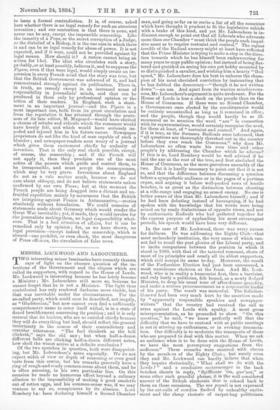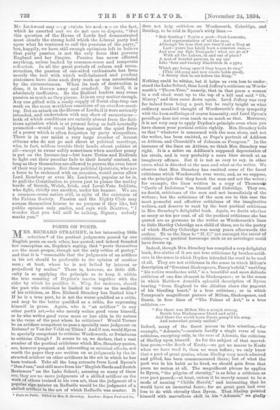MESSRS. LOCK WOOD AND LABOUCHERE.
TWO interesting minor luminaries have recently thrown rays of light on the obscure question of the in- tentions of the Government and the cliques which are called its supporters, with regard to the House of Lords. Mr. Lockwood is interesting because he has lately become a Minister ; Mr. Labouchere still more so, because he cannot forget that he is not a Minister. The light thus contributed has only rendered darkness more visible, but that was inevitable under the circumstances. For the so-called party, which could once be described, not inaptly, as " Gladstonian," but now cannot even find a sufficiently comprehensive name to cover itself withal, is in a state of dazed bewilderment concerning its position ; and it is only natural that its leaders, who are so entitled chiefly because they will do everything but lead, should reflect the general uncertainty in the course of their contradictory and oracular utterances. " The fool thinketh as the bell chnketh," says the old saw ; but when half-a-dozen different bells are clinking half-a-dozen different notes, how shall the wisest arrive at a definite conclusion ?
Of the two speeches in question, both were disappoint- ing, but Mr. Labouchere's more especially. We do not expect width of view or depth of reasoning or even good taste from this orator, but his remarks generally have a ring of rough-and-ready common-sense about them, and he is often amusing, in his own particular line. On this occasion he made no humorous effort beyond a culinary allusion to the impossibility of making a good omelette out of rotten eggs, and his common-sense was, if we may venture to say so, conspicuous by its absence. Lord Rosebery hal been declaring himself a Second Chamber man, and going so far as to recite a list of all the countries i which have thought it prudent to fit the legislative vehicle with a brake of this kind, and yet Mr. Labouchere is in- discreet enough to point out that all Liberals who advocate more than one Chamber " must think the people such impul- sive asses as to require restraint and control." The enfant terrible of the Radical nursery might at least have reflected that the Prime Minister is trying to make a step in the direc- tion towards which be has himself been endeavouring for many years to urge public opinion; but instead of being flat- tered and gratified on seeing his own pet hobby mounted by so distinguished a cavalier, and wishing him a hearty " God speed," Mr. Labouchere does his best to unhorse the cham- pion of his most cherished conviction by insinuating that he has dubbed the democracy—" though it be not written down "—an ass. And apart from its wanton mischievous- ness, Mr. Labouchere's argument is quite irrelevant. For the House of Lords is less a check on the people than on the House of Commons. If there were no Second Chamber, a Government once elected by the constituencies would be entirely uncontrolled as long as it remained in office; and the people, though they would hardly be so ill- mannered as to mention the word " ass " in connection with its representatives, would certainly recognise the need, for them at least, of " restraint and control." And again, if it is true, as the Swansea Radicals were informed, that "all questions are thoroughly threshed out in the country before they ever reach the Commons," why does Mr. Labouchere so often waste his own time and other people's by addressing the Chamber which he adorns ? If this is so, Lord Rosebery would be well advised if he laid the axe at the root of the tree, and first abolished the House of Commons, as the more garrulous assembly of the two. But it is hardly necessary to point out that it is not so, and that the difference between discussing a question before a sympathetic audience or in the pages of a partisan organ, and arguing it before well-packed rows of hostile benches, is as great as the distinction between shooting at a rifle-range and engaging an armed enemy. No one is better aware of this than Mr. Labouchere himself ; and if he had been debating instead of haranguing, if he had spoken with the knowledge that his words were being seized on by ready dialecticians of opposite views, and not by enthusiastic Radicals who had gathered together for the express purpose of applauding his most extravagant periods, his speech would have been very different.
In the case of Mr. Lockwood, there was every excuse for dullness. He was addressing the Eighty Club—that most melancholy institution, the very name of which can- not fail to recall the past glories of the Liberal party, and to incite comparison between the position in which it stood in 1880, with that of the tattered remnant, shorn of most of its principles and nearly all its ablest supporters, which still usurps its name to-day. Moreover, the result of the Forfarshire Election had just been announced, a most unwelcome skeleton at the feast. And Mr. Lock- wood, who is in reality a bumourist first, then a barrister, and only lastly a politician, felt bound, as a newly fledged Minister, to drop hisusual tone of after-dinner geniality, and make a serious pronouncement as a responsible leader of his party. The result was mournful. The Solicitor- General had been very much hurt by the assertion made by " apparently responsible speakers and newspaper- writers " that the country had received the call to arms against the Lords with apathy. A most gross misrepresentation, as he proceeded to show. " On this question," he said, " we know perfectly well that the difficulty that we have to contend with at public meetings is not in stirring up enthusiasm, or in evoking denuncia- tion. Our difficulty is to moderate the transports of those who are prepared to deal with this matter. When we ask an audience what is to be done with the House of Lords, we have the most peremptory suggestions from the audience." These remarks were received with cheers by the members of the Eighty Club ; but surely even they and Mr. Lockwood can hardly believe that when they inquire rhetorically, " What shall we do with the Lords ? " and a combative costermonger in the back benches shouts in reply, " Spiffiicate 'em, guv'nor," or i some other such graceful phrase, it is the well considered answer of the British electorate that is echoed back to them on these occasions. The vox populi is not expressed by the cat-calls of rowdies flushed by unhealthy excite- ment and the cheap rhetoric of carpet-bag politicians. Mr. Lockwood may cei g atulate his audit n;(3, on the fact, which he asserted and we do not care to dispute, "that this question of the House of Lords had demonstrated most clearly the strong hold which the Liberal party had upon what he ventured to call the passions of the party," but, happily, we have still enough optimism left to believe that party passion is not the only force that governs England and her Empire. Passion has never effected anything, unless backed by common-sense and temperate reflection. In all the great periods of reform and recon- struction, the passion of one-sided enthusiasts has been merely the tool with which well-balanced and prudent statesmen have done such dirty work as was necessitated by the circumstances. When its task of destruction is done, it is thrown away and crushed. By itself, it is absolutely ineffective. So the Radical leaders may rouse passion as much as they please. It is an easy matter enough. Any one gifted with a ready supply of fluent clap-trap can work on the more worthless emotions of an overflow-meet- ing. But an attack on the House of Lords, if it wore seriously intended, and undertaken with any show of earnestness— both of which conditions are entirely absent from the ficti- tious agitation which is at present being so half-heartedly promoted—would recoil helpless against the quiet force of a power which is often forgotten by party wirepullers. There is in our midst a very large number of honest citizens who do not go and shout at political meetings, who, in fact, seldom trouble their heads about politics at all—except to swear softly sometimes when another penny is put on the Income-tax—but leave Tories and Radicals to fight out their peculiar fads to their hearts' content, as long as they themselves are allowed to pursue the even tenor of their way in peace. But these political Quietists, who are a force to be reckoned with on occasion, would never allow Lord Rosebery or even Mr. Lockwood, popular as be is, to pull the Constitution to pieces just to please the motley horde of Scotch, Welsh, Irish, and Local-Veto faddists, who fight, chiefly one another, under his banner. We are a common-sense nation still, in spite of the existence of the Fabian Society. Passion and the Eighty Club may scream themselves hoarse to no purpose if they like, but public opinion only smiles, and says with Beatrice, " I wonder that you will still be talking, Signor; nobody marks you."







































 Previous page
Previous page